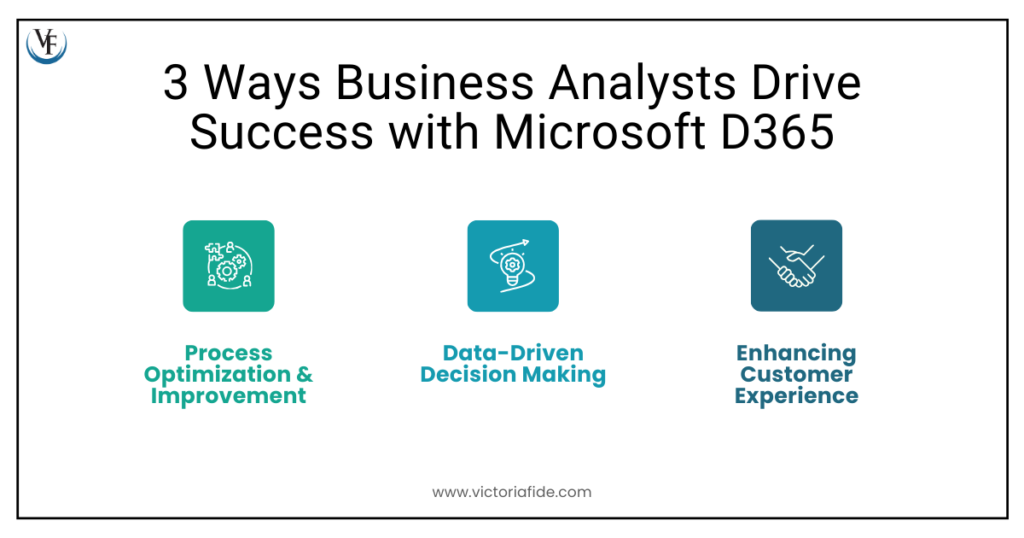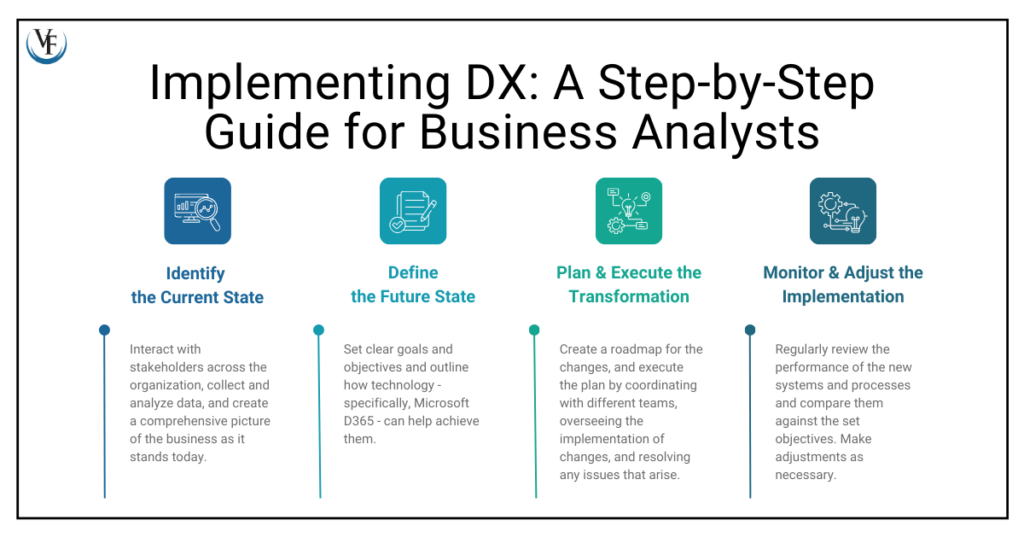
3 Ways Business Analysts Drive Success with Microsoft D365
Table of Contents
Introduction
Understanding Digital Transformation
Digital transformation can be defined as integrating digital technology into all areas of a business, fundamentally changing how you operate and deliver value to customers. It goes beyond merely adopting new technologies; it involves a cultural shift that requires organizations to continually challenge the status quo, experiment, and become comfortable with failure. The goal is to improve the customer experience, streamline operations, empower the workforce, and make data-driven decisions.
The Role of Business Analysts in a Digitally Evolving Landscape
Business analysts are at the forefront of technological change in organizations. Their primary role in digital transformation is to align technological advances with business objectives, enhancing efficiency and value from investments in technology, people, and processes. They serve as the bridge between the business needs and the IT department, ensuring that systems and procedures are optimized to meet the requirements of the users and the organization’s strategic goals. They are involved in defining requirements, setting up project plans, ensuring communication across all stakeholders, and ultimately leading the implementation of digital strategies.
Brief Overview of Microsoft Dynamics 365
Microsoft Dynamics 365 (D365) is a suite of business applications that helps enterprises run their entire business end-to-end in the cloud. It brings together what was formerly a range of different elements: customer relationship management (CRM), enterprise resource planning (ERP), and business intelligence (BI) into a single, unified platform. Its flexible architecture allows organizations to adopt the entire suite or only specific modules that meet their unique business needs. It provides tools to manage and analyze customer relationships, supply chain, finance, human resources, and more. The role of a business analyst becomes critical in understanding and utilizing these tools to aid in the company’s digital transformation journey.
The Intersection of Business Analysis, Digital Transformation, and Microsoft D365
The Vitality of Business Analysis in Digital Transformation
Business Analysis plays a crucial role in digital transformation initiatives. Business Analysts (BAs) work as facilitators, negotiators, and mediators between different stakeholders to align business needs with technological solutions. They help identify opportunities for improvement, streamline operations, enhance customer experience, and deliver competitive advantage. BAs are instrumental in guiding an organization through the maze of digital transformation, from vision setting and strategy formulation to execution and ongoing optimization.
Microsoft D365: A Crucial Catalyst for Digital Transformation
Microsoft Dynamics 365 acts as a driving force for digital transformation. This cloud-based suite of business applications provides end-to-end solutions, integrating all major business functions like sales, customer service, finance, operations, and marketing. It helps businesses to break down silos between different departments and provides a unified view of the organization, which is essential for effective digital transformation. With D365, organizations can gain real-time insights, make data-driven decisions, automate processes, and deliver superior customer experiences.
The Synergic Relationship Between Business Analysts and Microsoft D365
Business Analysts and Microsoft D365 together create a powerful combination to drive digital transformation. With their deep understanding of business processes and needs, BAs leverage D365 to implement solutions that deliver value and drive growth. They use the platform to map existing processes, identify gaps, and suggest improvements, bringing together people, processes, and technology.
They also play a vital role in training the workforce on D365 and driving its adoption across the organization. From defining requirements to testing solutions, monitoring implementation, and ensuring user acceptance, BAs ensure that the D365 functionalities align with the organization’s strategic goals and objectives. This synergic relationship helps the organization to navigate the complexities of digital transformation successfully.

First Approach: Process Optimization and Improvement
The Role of Business Analysts in Process Improvement
Process optimization is a fundamental aspect of digital transformation, and Business Analysts (BAs) play a pivotal role in it. BAs identify inefficiencies in existing processes, suggest improvements, and ensure their successful implementation. They consider the needs of the business and its users, examining how work is carried out and identifying opportunities for optimization. Through process mapping, root cause analysis, and stakeholder management, BAs bring about improvements that make processes more efficient and effective.
Implementing Microsoft D365 for Process Enhancement
Microsoft Dynamics 365 (D365) provides several tools and features for process enhancement. The suite of applications in D365 allows for automation of routine tasks, improved data accuracy, real-time visibility into operations, and more seamless communication across teams. For example, D365’s automated workflows can reduce manual intervention in various processes, increasing efficiency and accuracy. The analytics capabilities of D365 can provide detailed insights into processes, allowing for continuous improvement based on data-driven decision-making.
Potential Benefits and Challenges
The benefits of process optimization are manifold, including improved efficiency, reduced errors, enhanced customer satisfaction, and cost savings. However, the journey towards process improvement is not without challenges. It requires a deep understanding of the business, effective change management, and the ability to deal with resistance from users accustomed to existing ways of working. Business analysts, with their communication, problem-solving, and change management skills, can help address these challenges and drive the successful implementation of process improvements using Microsoft D365.
Second Approach: Data-Driven Decision Making
The Imperative for Data-Driven Strategies
In the age of digital transformation, companies that make decisions based on data-driven insights are more likely to thrive than those that do not. Data-driven decision-making involves collecting data from various business processes and using analytical models and algorithms to gain insights and make strategic decisions. A data-driven approach can improve business outcomes, including improved efficiency, profitability, and customer satisfaction. Business analysts play a critical role in this approach, helping to identify the necessary data, analyze it, and translate the findings into actionable strategies.
Leveraging Microsoft D365 for Insightful Business Analytics
Microsoft Dynamics 365 (D365) offers powerful analytics capabilities that can help organizations adopt a data-driven approach. D365 includes built-in analytics tools that can process large volumes of data and provide real-time insights. It can generate comprehensive reports and dashboards that visualize data in a way that is easy to understand and act upon. Business analysts can use these tools to monitor key performance indicators (KPIs), identify trends, and make predictions, providing valuable inputs for strategic decision-making.
Potential Benefits and Challenges
Adopting a data-driven approach can provide numerous benefits, such as improved decision-making, increased operational efficiency, enhanced customer experience, and a competitive edge. However, there can also be challenges, such as data privacy and security concerns, difficulty integrating data from different sources, and the need for skills to analyze and interpret data effectively. Business analysts, with their expertise in data analysis and problem-solving, can help organizations navigate these challenges and harness the power of data to drive digital transformation.
Third Approach: Enhancing Customer Experience and Engagement
The Importance of Customer Experience in the Digital Era
In the digital era, customer experience has become a key differentiator for businesses. It involves understanding the customer’s journey across all touchpoints and making it as smooth and enjoyable as possible. A superior customer experience can lead to higher customer satisfaction, loyalty, and advocacy, driving growth and profitability for the business. Business analysts play a significant role in enhancing customer experience, as they help to design customer-centric processes and systems, considering the needs and preferences of the customers.
Using Microsoft D365 for Enhanced Customer Engagement
Microsoft Dynamics 365 (D365) provides a range of features that can help to enhance customer experience and engagement. Its Customer Service module enables businesses to provide personalized, efficient service across multiple channels. The Sales module supports the sales process with capabilities such as contact management, opportunity management, and predictive insights. The Marketing module allows businesses to create and track marketing campaigns, automate marketing processes, and gain insights into customer behavior. Business analysts can leverage these features to design and implement strategies that enhance customer experience.
Potential Benefits and Challenges
Enhancing customer experience can provide numerous benefits, such as increased customer satisfaction, loyalty, advocacy, and improved business performance. However, it also presents challenges, such as understanding and catering to diverse customer needs, integrating customer data from multiple sources, and ensuring data privacy and security. Business analysts, with their skills in problem-solving, communication, and stakeholder management, can help businesses to navigate these challenges and use D365 effectively to enhance customer experience.
Implementing Digital Transformation: A Step-by-Step Guide for Business Analysts
Understanding the Current State of the Business
The first step for a BA in a digital transformation journey is to gain a deep understanding of the current state of the business. This involves examining the existing business processes, systems, and culture, and identifying strengths, weaknesses, opportunities, and threats. It requires the BA to interact with stakeholders across the organization, collect and analyze data, and create a comprehensive picture of the business as it stands today.
Defining the Future State: The Role of Microsoft D365
Once the current state is understood, the BA must define the future state of the business – how it should look after the digital transformation. This involves setting clear goals and objectives and outlining how technology – specifically, Microsoft D365 – can help to achieve them. The BA must consider the different features of D365 and how they can be used to improve processes, make data-driven decisions, and enhance customer experience.

Planning and Executing the Transformation
After the future state is defined, the BA must develop a plan for implementing the digital transformation. This includes creating a roadmap for the changes to be made, allocating resources, setting timelines, and defining measures of success. The BA also plays a crucial role in executing the plan, coordinating with different teams, overseeing the implementation of changes, and resolving any issues that arise.
Monitoring and Adjusting the Implementation
Once the transformation is underway, the BA must monitor its progress, using the measures of success defined in the plan. They should regularly review the performance of the new systems and processes and compare them against the set objectives. Based on the findings, they may need to adjust the plan and make changes as necessary. The aim is to ensure that the digital transformation achieves its intended outcomes and delivers value to the business.
Challenges in Digital Transformation and How Business Analysts Can Overcome Them
Identifying Potential Obstacles in Digital Transformation
Every digital transformation journey is filled with potential obstacles. Some of the common challenges include resistance to change from employees, data privacy and security concerns, integrating systems and data, ensuring business continuity during the transformation, and dealing with legacy systems and processes. It’s the responsibility of a Business Analyst (BA) to foresee these obstacles based on their understanding of the organization and its dynamics.
Role of Business Analysts in Mitigating These Challenges
BAs play a pivotal role in mitigating the challenges that arise during a digital transformation. They can use their skills in communication, stakeholder management, problem-solving, and change management to address these issues effectively. For example, to tackle resistance to change, BAs can involve users in the transformation process, communicate the benefits of change clearly, and provide training and support to help them adapt. They can also work closely with the IT department to address data privacy and security concerns and ensure that new systems are integrated smoothly with existing ones.
Microsoft D365 as a Solution to Overcome Challenges
Microsoft Dynamics 365 (D365) can be a powerful tool for overcoming many of the challenges in a digital transformation. Its integrated suite of business applications allows for efficient data management and analytics, which can help to address data privacy and security concerns. Its user-friendly interface and customizable features can reduce resistance to change and ease the transition for users. Moreover, D365’s ability to integrate with a wide range of other systems can simplify the process of replacing or working with legacy systems. BAs can leverage these features of D365 to guide the organization through a successful digital transformation.
The Integral Role of Business Analysts in Digital Transformation
Key Takeaways
Digital transformation represents a profound shift in the way businesses operate, opening doors to new opportunities for growth, efficiency, and customer satisfaction. Microsoft Dynamics 365 (D365) acts as a crucial catalyst in this transformation, providing comprehensive, integrated solutions that address various business needs. The role of business analysts is integral in this context as they bridge the gap between business needs and technological solutions. They use their expertise to guide the organization through the complexities of digital transformation, leveraging D365 to streamline processes, make data-driven decisions, and enhance customer experience.
Looking Towards the Future of Digital Transformation
As businesses continue to evolve in response to changing technologies and market demands, the role of business analysts will become even more important. They will need to stay abreast of new developments in technology, including advancements in D365, and continually adapt their approaches to support their organizations’ digital transformation journeys. They will need to be agile, adaptable, and innovative, helping their organizations to navigate the challenges and seize the opportunities presented by the digital era.
Final Thoughts
Digital transformation is not a one-off project but an ongoing journey. It requires continuous learning, experimentation, and adaptation. In this journey, business analysts serve as navigators, guiding their organizations toward a digitally mature future. Through their deep understanding of the business, strong problem-solving skills, and ability to leverage D365, they can drive change that delivers tangible value, making them an indispensable asset in any organization’s digital transformation journey.
Implementing D365?
We bridge the gap between you and your implementation partner to help guide your business to new heights through our business IT strategy and business process optimization services.
Take control of your project’s success today and schedule a free 30-minute consultation with Tory Bjorklund, the founder and CEO of Victoria Fide.

About the Author
Shana Gibbons is the Warehousing and Supply Chain Business Process Consultant. She has over 16 years of experience working in the Supply Chain and Warehousing space, and she is deeply passionate about building relationships with her clients and teams in order to help them navigate through their Warehouse and Supply Chain ups and downs.
